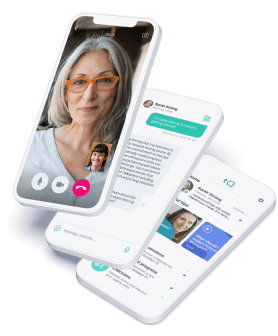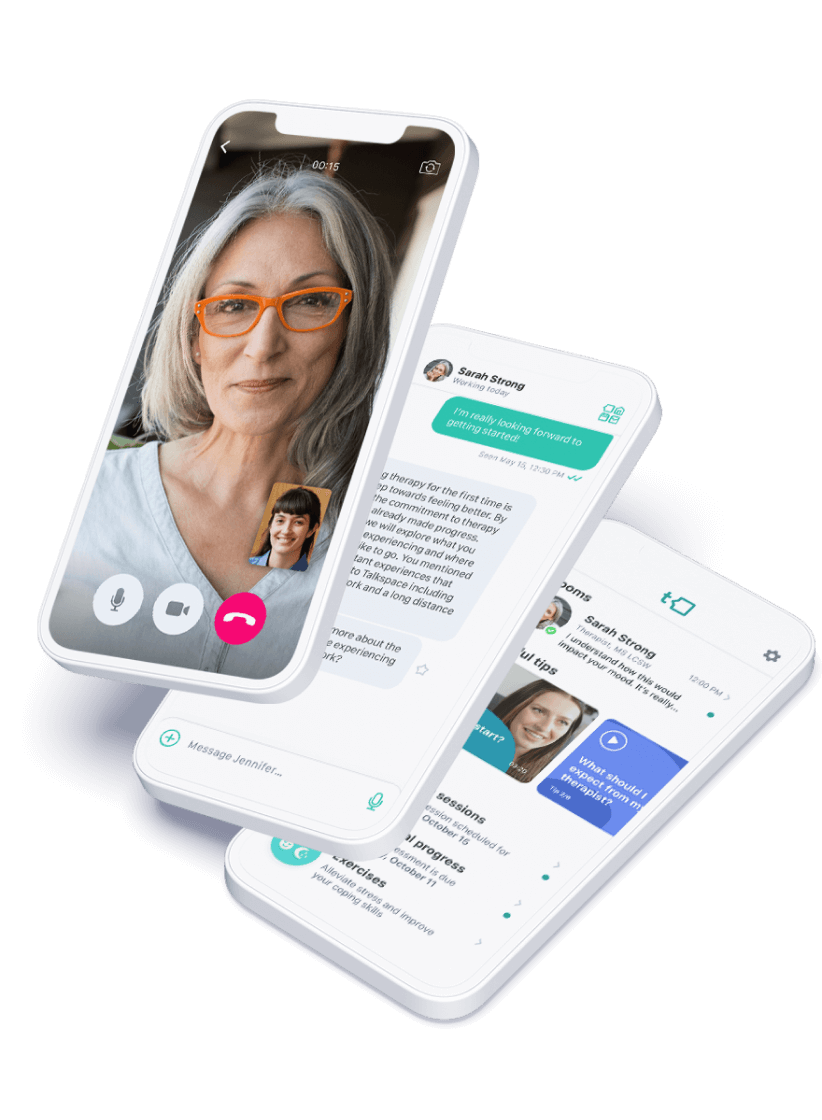Updated On: May 3, 2024
Overview
Updated on 3/28/2022
Anxiety can cause side effects that show up both physically and psychologically. Understanding the difference between the signs and symptoms of anxiety can help you determine if your anxiety (or a loved one’s) is getting severe enough that you should reach out for help.
Here, you’ll get the information you need about how to treat anxiety as well as find support if severe anxiety is affecting your daily life. You’ll also gain access to tips for self-care and guidance for your family and loved ones, so together, you can get through those days when it feels like your anxiety might just get the best of you. Read on to learn more.
Signs of Anxiety
The signs and symptoms of anxiety are different. Signs of anxiety are behaviors or sensations that represent the initial phases of anxiety before it causes physical, emotional, or physiological symptoms. The signs of anxiety can be clues to help you understand if your stress is possibly sparking some type of anxiety
“Anxiety manifests itself in a variety of ways, and we’re not always aware of it until we’re faced with it. Signs that a person struggles with anxiety can vary, but it doesn’t mean the person can’t eventually recognize it. Some common signs are feeling constantly on edge, restlessness, and feeling burnt out. Understanding our own body and mind helps to recognize the signs.”
 Licensed Mental Health Counselor (LMHC), MS Minkyung Chung
Licensed Mental Health Counselor (LMHC), MS Minkyung Chung
Symptoms of Anxiety
There are several physical symptoms of anxiety that are important to be aware of. However, while physical anxiety disorder symptoms are often talked about and may seem easier to recognize, there are also behavioral symptoms you should understand so you know what to look for.
“The symptoms of anxiety often overlap the signs of anxiety. Some key points of symptoms of anxiety are our overall health and mindset. Individuals struggling with anxiety tend to constantly worry/overthink, have trouble with concentration/motivation, and can be irritable at times. As time goes on, it creates added stress into daily functioning and may worsen symptoms of anxiety to include anxiety/panic attacks.”
 Licensed Mental Health Counselor (LMHC), MS Minkyung Chung
Licensed Mental Health Counselor (LMHC), MS Minkyung Chung
Behavioral symptoms of anxiety
Some of the effects that intense anxiety can have on your mind and behavior patterns include feeling like you’re:
- Out of touch with reality
- Depressed and having a low mood
- Constantly tense and unable to relax
- Combatting a sense of dread and intense fear for the worst
- Self-conscious, believing others are looking at you
- Going to allow bad things to happen if you stop worrying
- Anxious about anxiety itself, stressing that you might have a panic attack or anxiety attack
- In need of excessive reassurance from others, always believing they’re angry or upset with you
The mental effects of intense anxiety can also include:
- Rumination (reliving bad experiences)
- Depersonalization (feeling disconnected from your body and mind)
- Derealization (feeling the world isn’t real)
Physical symptoms of anxiety
Chronic anxiety can also have negative, taxing, physical anxiety disorder symptoms, including:
- Headaches
- Backaches
- Blurry vision
- Anxiety chest pain
- Other bodily aches with no logical origin
- Feeling pins and needles in your extremities
- A fast, irregular, or thumping heartbeat
- Churning, upset stomach, and nausea
- Lightheadedness or dizziness
- Having hot or cold flashes
- Shallow, rapid breathing
- Teeth grinding
The physical symptoms of anxiety may also include noticeable changes in:
- Appetite
- Sleeping habits
- Toiletry habits
- Sex drive
Managing Symptoms of Anxiety
There are many things you can do — on your own, in the comfort of your own home, during the times that conveniently work with your schedule — to manage an anxiety symptom if it arises. Let’s review some self-care coping strategies and tactics you can practice to prevent and manage signs and common symptoms of anxiety.
“Anxiety disorders are completely manageable in several ways. Working with a professional to help find the right coping skills is important. Other things that can help are looking at the ‘trifecta’ of one’s overall health (diet, exercise, sleep), healthy coping skills, and medication. Each person’s journey to managing anxiety is different and tailored to their individual personality. Asking for help in learning about these tools is often the first step.”
 Licensed Mental Health Counselor (LMHC), MS Minkyung Chung
Licensed Mental Health Counselor (LMHC), MS Minkyung Chung
Discover your triggers
Before you can stop excessive anxiety, it can be useful to figure out what’s causing it. Learning your triggers means you can try to avoid them.
- Does a specific person make you anxious? Limit or avoid spending time with them.
- Do you know you get nervous in a social situation? Try meditating before the next one.
- Is social media giving you an anxiety attack? Take a break from it.
- Are you overwhelmed by your to-do list? Divide your tasks into manageable, shorter lists and work one day at a time.
What causes anxiety cannot always be avoided, but knowing your triggers can be powerful in managing how severe it gets.
Take a few minutes for yourself
Sit back, take a deep breath, and remember that everything will be OK. Just taking a moment to step away from your emotions can help clear your head. Sometimes, this means literally getting up and walking away from whatever is giving you excessive anxiety. Give yourself a 5-minute break and re-center.
Watch what you eat
The foods that we eat can greatly affect our cognitive abilities and our moods. Nutrients like magnesium, vitamin D, and healthy fatty acids are very important for emotional regulation.
Take a deep breath
Deep breathing exercises are very effective for shifting our minds from sympathetic modes to parasympathetic modes. When we are calm, we breathe deep and slow. When we’re anxious, we breathe shallow and fast. You can switch your mind from being anxious to calm by intentionally taking deep, slow breaths. Research shows that diaphragmatic breathing has positive effects on our stress response and more.
Hydrate
Aside from the air we breathe, water is our most basic and important connection to life. After all, human adults are 60% water. Keeping your cells well-hydrated goes a long way toward helping you remain calm and healthy.
Get some exercise — yes, every day
Find some form of physical activity that you enjoy and do it every day. You don’t have to train like an athlete. Just move your body enough to cause light perspiration. Studies confirm that physical activity can actually protect you from anxiety disorders. This will relieve muscle tension, deliver nutrients throughout your body and mind via enhanced circulation, stimulate your lymphatic system, and offer you all the other benefits of exercise.
Be mindful of your caffeine intake
Caffeine stimulates the nervous system and can increase some common symptoms of anxiety. Consider limiting your intake of coffee, black tea, energy drinks, and other caffeinated beverages. You don’t necessarily have to give up your morning cup of Joe altogether, but you should think about limiting how much caffeine you have every day.
Get a good night’s rest
It can be difficult to get enough rest when you’re anxious, but sleep is essential to keeping your anxiety in check. Consider taking a natural sleep aid like melatonin or diffusing some calming essential oils before sleeping — lavender and chamomile are good choices. Creating an environment that’s relaxing, taking time to wind down, and limiting screen time for at least 30 minutes before going to sleep are all effective ways to ensure you rest well.
Understand that you’re not in control of everything
Control is something that makes us feel safe, but unfortunately it’s not always within reach. Remind yourself that things won’t always go your way. Many times, an anxiety symptom is caused by unknown forces, so be realistic with yourself and admit that you can only do your best with what you can control. Worrying about things you can’t control won’t help or change anything.
Practice mindful meditation
Paying attention to your thoughts and breathing is a very effective method for decreasing several common symptoms of anxiety. Be aware of your thoughts. Watch your breath. With a calm mind, make your breathing deep and slow. The goal of this meditation is to always watch your breath and your thoughts in real-time so you can remain in control of your emotions and anxiety symptoms. Try downloading a guided meditation app if you’re new to meditating.
Do your best to be positive
When you catch yourself feeling low, try to replace your negative thoughts with positive ones. Consider saying a mantra to yourself, like “I am worthy of happiness today.” When negativity arises, repeating something positive to yourself can counteract those destructive thoughts. Journaling and keeping a gratitude list are both known to be effective ways to increase positivity and reduce anxiety, especially when combined with meditation and deep breathing techniques.
When to Seek a Professional
Everyone experiences anxiety from time to time; it’s a natural reaction to stress or intense fear. However, if you’ve been noticing signs and symptoms of anxiety daily for six months or more, it could indicate an anxiety disorder. Generalized anxiety disorder, social anxiety disorder, panic disorder, and post traumatic stress disorder can all be debilitating conditions with symptoms that seldom self-resolve. Familiarizing yourself with the symptoms of anxiety and taking on online anxiety screening can help you determine whether the worry and fear you may feel could be a sign of a more serious condition.
If you believe your emotions are interrupting your quality of life, you should reach out for help from a licensed mental health professional. Therapy for anxiety will likely include a combination of cognitive behavioral therapy, and possibly, anti-anxiety medications. Working with a professional through online therapy can help decrease the frequency and severity of your anxiety signs and symptoms.
See References
-
Facts & Statistics
Anxiety and Depression Association of America, ADAA. Adaa.org.
-
Anxiety Disorders
National Institute of Mental Health (NIMH). Accessed February 22, 2022.
-
Evidence of the Importance of Dietary Habits Regarding Depressive Symptoms and Depression
Ljungberg T, Bondza E, Lethin C. Int J Environ Res Public Health. 2020;17(5):1616. doi:10.3390/ijerph17051616. Accessed February 22, 2022.
-
The Effect of Diaphragmatic Breathing on Attention, Negative Affect and Stress in Healthy Adults
Ma X, Yue Z, Gong Z et al. Front Psychol. 2017;8. doi:10.3389/fpsyg.2017.00874. Accessed February 22, 2022.
-
The Water in You: Water and the Human Body
U.S. Geological Survey. Usgs.gov. Accessed February 22, 2022.
-
Exercise and Anxiety
Kandola A, Stubbs B. Physical Exercise for Human Health. 2020:345-352. doi:10.1007/978-981-15-1792-1_23. Accessed February 22, 2022.

Marris is a freelance writer who is passionate about health and wellness, particularly in the areas of mental health and women’s health. She hopes that her articles will play a role in ensuring that these areas are discussed more widely. In her free time, she also writes short stories and reads anything she can get her hands on.
Articles about Generalized Anxiety Disorder
View all articles
Overcoming Parental Anxiety: Strategies for a Calmer Mind

15 Effective Coping Skills for Anxiety

Acupuncture for Anxiety: Does it Work?

Does Alcohol Cause Anxiety? Exploring the Connection

Agoraphobia vs Social Anxiety Disorder: What’s the Difference?

13 Best Jobs for People with Social Anxiety

Election Anxiety: How to Cope With Political Stress

Social Anxiety vs Autism: How to Tell the Difference

Anxiety & Fatigue: Exploring Why Anxiety Makes You Tired

Anxiety and Anger: Why Anxious Feelings Can Make You Angry


